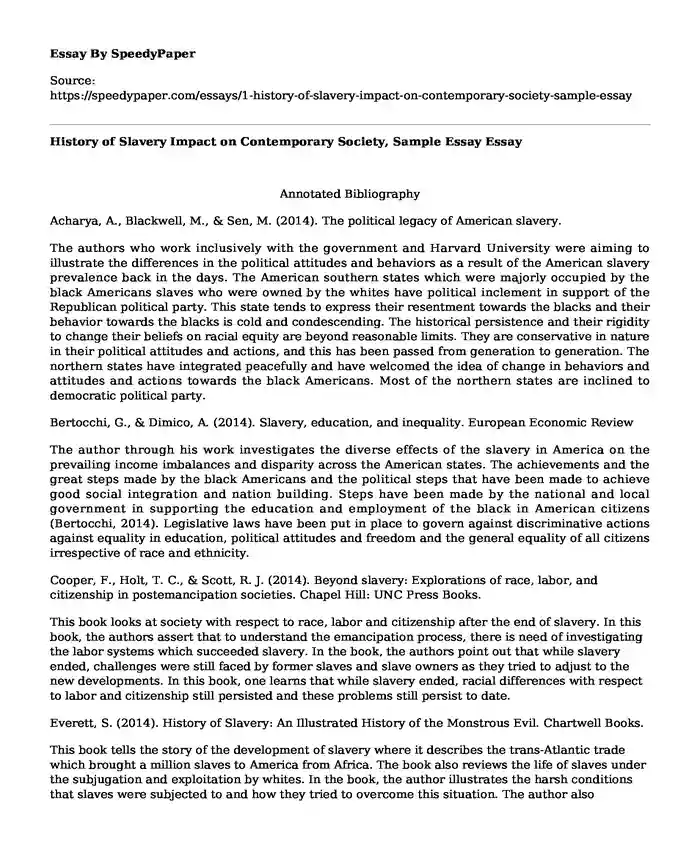Annotated Bibliography
Acharya, A., Blackwell, M., & Sen, M. (2014). The political legacy of American slavery.
The authors who work inclusively with the government and Harvard University were aiming to illustrate the differences in the political attitudes and behaviors as a result of the American slavery prevalence back in the days. The American southern states which were majorly occupied by the black Americans slaves who were owned by the whites have political inclement in support of the Republican political party. This state tends to express their resentment towards the blacks and their behavior towards the blacks is cold and condescending. The historical persistence and their rigidity to change their beliefs on racial equity are beyond reasonable limits. They are conservative in nature in their political attitudes and actions, and this has been passed from generation to generation. The northern states have integrated peacefully and have welcomed the idea of change in behaviors and attitudes and actions towards the black Americans. Most of the northern states are inclined to democratic political party.
Bertocchi, G., & Dimico, A. (2014). Slavery, education, and inequality. European Economic Review
The author through his work investigates the diverse effects of the slavery in America on the prevailing income imbalances and disparity across the American states. The achievements and the great steps made by the black Americans and the political steps that have been made to achieve good social integration and nation building. Steps have been made by the national and local government in supporting the education and employment of the black in American citizens (Bertocchi, 2014). Legislative laws have been put in place to govern against discriminative actions against equality in education, political attitudes and freedom and the general equality of all citizens irrespective of race and ethnicity.
Cooper, F., Holt, T. C., & Scott, R. J. (2014). Beyond slavery: Explorations of race, labor, and citizenship in postemancipation societies. Chapel Hill: UNC Press Books.
This book looks at society with respect to race, labor and citizenship after the end of slavery. In this book, the authors assert that to understand the emancipation process, there is need of investigating the labor systems which succeeded slavery. In the book, the authors point out that while slavery ended, challenges were still faced by former slaves and slave owners as they tried to adjust to the new developments. In this book, one learns that while slavery ended, racial differences with respect to labor and citizenship still persisted and these problems still persist to date.
Everett, S. (2014). History of Slavery: An Illustrated History of the Monstrous Evil. Chartwell Books.
This book tells the story of the development of slavery where it describes the trans-Atlantic trade which brought a million slaves to America from Africa. The book also reviews the life of slaves under the subjugation and exploitation by whites. In the book, the author illustrates the harsh conditions that slaves were subjected to and how they tried to overcome this situation. The author also addresses the issue of abolition movement where she analyzes the events that led to the rise of the movement. The book concludes with looking at how slavery is an issue by analyzing how slavery continues to affect the contemporary society.
R Lovejoy, P. E. (2009). Identity in the Shadow of Slavery. London: Continuum International Pub. Group.
This book looks at the effect of slavery on enslaved Africans and their descendants. It addresses issues related to gender, cultural, and ethnic factors through which slaves and their descendants interpreted their lives thereby creating societies with a shared identity. The book provides insight into how slavery resulted in a change in identities of African slaves as well as the development of new identities through the interaction of European and African culture. The book offers a critical review of the theoretical and cultural parameters of the black Atlantic world and offers readers insight into international experiences during slavery and how these experiences have shaped the contemporary black society.
Cite this page
History of Slavery Impact on Contemporary Society, Sample Essay. (2017, Nov 03). Retrieved from https://speedypaper.net/essays/1-history-of-slavery-impact-on-contemporary-society-sample-essay
Request Removal
If you are the original author of this essay and no longer wish to have it published on the SpeedyPaper website, please click below to request its removal:
- Free Essay on Nutrition in Preventive Medicine
- Personal Essay Sample: The Worst Exam Experience
- Exponents - Mathematics Essay Example
- Industrialization of Multinational Enterprises, Essay Sample for Everyone
- Free Essay with the Analysis Report: "The Last Great Clothing Store"
- Free Essay on Maintaining Safety at the Construction Sites
- Free Essay. Structured vs. Unstructured Data
Popular categories





